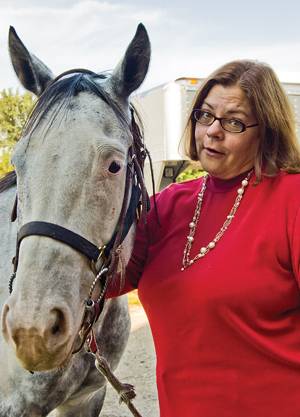Get to Know: Barbara Mack

Portrait of Barbara Mack with horses (one of her favorite pastimes) on Sept. 24, 2008, at the Horse Barns. Photo: Logan Gaedke/Iowa State Daily
October 7, 2008
For those who expect to sleep, text and use Facebook through class, Barbara Mack is not the professor for you. Mack demands respect among students, and respect she receives. Sound intimidating? Don’t be intimidated yet. Most students who have had a class with her consider her motivating, knowledgeable and endlessly entertaining.
Full name: Barbara Mack
Occupation: Associate professor of journalism and mass communication
Universities attended: Iowa State undergraduate degree, Drake University law degree
Classes taught: JL MC 101 (Mass Media and Society), JL MC 460 (Law of Mass Communication) and JL MC 462 (Media Ethics). She has also taught 10 other courses over her 21 years at Iowa State.
Other on-campus involvement: Student Advisory Board and Society of Friends
What Mack was like in college: Very driven. Mack commuted from Des Moines to take full class schedules during the school year, taking between 18 and 21 credits. In addition to attending night classes at Drake, summer classes at Iowa State, she also worked at The Des Moines Register.
Funniest thing Mack has seen at Iowa State: She once let a student pie her in the face as an “observation experiment” in her JL MC 101 class. She said she can no longer allow the experiment because most lecture halls are carpeted.
Advice for freshmen: Go to class. Don’t overcommit: Find one thing that you are passionate about and get deeply involved. Freshmen are in charge of themselves and their own actions. “You now pay adult prices for adult mistakes,” Mack said.
Favorite thing about working with students: She loves having “the ability to open doors.” She enjoys working with enthusiastic, bright, talented students and influencing them.
Least favorite thing about working with students: Mack finds it “heartbreaking” to deal with cynical students.
Thoughts on the tuition increase: “When I was in school here, tuition was $600 a semester,” Mack said. She believes pushing students to pay for their education is crippling students and putting a large burden on young people. “We can’t finance our future on our children’s backs.”






